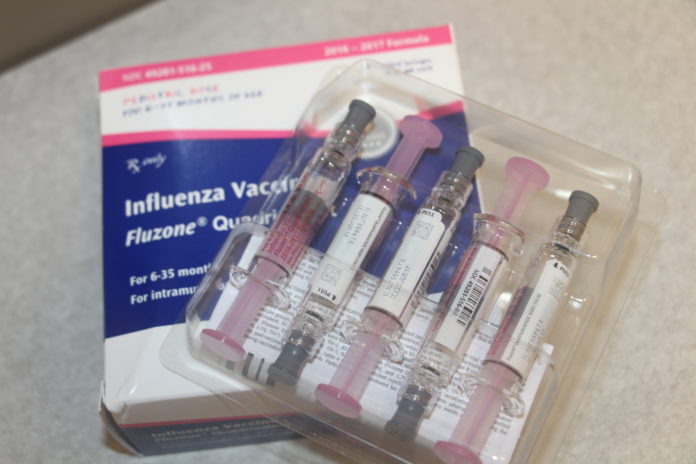
Story by Sarah Melchert
Fall may be the season for cooler weather and pumpkin spice, but it also can signify the start of the flu season. As flu season approaches, shots and vaccines are destined to follow.
According to the Center for Disease Control and Prevention website, “Influenza (flu) is a contagious respiratory illness caused by influenza viruses. It can cause mild to severe illness. Serious outcomes of flu infection can result in hospitalization or death.”
Christopher J. Papasian is professor and chair in the Department of Basic Medical Science at the UMKC School of Medicine, Microbiology Consultant at Truman Medical Center, and Editor of Clinical and Vaccine Immunology. Papasian said that the flu season begins in the late fall and early spring and can be serious.
“It is estimated that approximately 20,000 people in the U.S. die from complications of influenza during a typical year. Every few years, it can be significantly worse than that. Every few decades it gets much, much, more serious than that,” said Papasian.
Because the flu may have risks, Papasian said everyone over six months of age should get a flu shot.
Peggy Chandler is a Pre-Professional Nursing instructor at Summit Technology Academy. Chandler said that it is important to get a flu shot, and to get one every year.
“Flu viruses are constantly changing, so the vaccine composition is reviewed each year and updated as needed based on which influenza viruses are making people sick,” said Chandler.
Papasian also said that people should get annual flu shots due to changes in the virus. “Because the influenza virus mutates rapidly, immunity to the strains that prevailed last year may not protect against the strains that circulate this year,” said Papasian.
The flu shot may help prevent the flu. “It helps an individual develop immunity to strains of influenza that are anticipated to circulate in the upcoming flu season,” said Papasian.
“Recent studies have shown the vaccine reduces the risk of flu by about 50-60%. Although not 100%, receiving a flu shot may lessen the severity of symptoms, and possible hospitalization, if the individual does develop illness,” said Chandler.
Senior Maddie Martin said that she gets a flu shot every year. “I only got the flu once when I didn’t get the shot. I think they are effective at preventing the flu,” said Martin.
Papasian said that someone who does not get a flu shot can be at risk for infecting others.
“Someone who has not been vaccinated is likely to develop influenza and be highly infectious if exposed. They may be infectious before their symptoms develop, and may continue to be infectious after they return to work or school. Consequently, they will infect other individuals, facilitating the spread of disease,” said Papasian.
However, there can be precautions after getting the flu shot. West science teacher Rachel Rogers said that flu symptoms can still develop even after getting the shot.
“It takes about 2 weeks for your body to build up those antibodies after receiving the flu shot, so if you are exposed to the virus during that time you will likely still get the symptoms. It could also be that one is exposed to a different strain of the flu virus than what was included in the vaccination, thus resulting in experiencing the flu symptoms.”
The flu shot can have some side effects too. According to the Center for Disease Control and Prevention website, “The most common side effects from the influenza shot are soreness, redness, tenderness or swelling where the shot was given. Low-grade fever, headache and muscle aches also may occur.”
There are some instances in which someone cannot get a flu shot.
“Children younger than 6 months old and people with severe, life threatening allergies to flu vaccine or any of it’s ingredients cannot get a flu shot. People who have an allergy to eggs or other vaccine ingredients, people who have ever had Guillain-Barre Syndrome, and people who are feeling ill should talk to their doctor before getting the flu shot,” said Chandler.
Some choose not to receive flu shots annually. Senior Amanda Berkstresser said she doesn’t regularly get a flu shot.
“I feel like they don’t help your chances as much. There was one year where it seemed that people who got the shot had flu more often than those that don’t get the shot,” said Berkstresser.
Even though not all people may receive the flu shot, Chandler said that there are ways to prevent the spread of germs during flu season. These tips were shared with Chandler from Gina Gavin, the Registered Nurse from Bernard Campbell Middle School.
“Wash hands often with soap and water, cover your nose and mouth with a tissue or your sleeve when you cough or sneeze, avoid touching eyes, nose, or mouth, practice good health habits, get plenty of sleep and exercise, manage your stress, drink plenty of fluids, eat healthy food, bathe daily, and discuss with your family if getting the flu shot is right for you,” said Chandler.
The flu season may be arriving soon, and getting a flu shot may have added benefits in protecting from the flu. However, receiving the flu shot can be a personal choice and may vary from person to person, but measures can still be taken to stay healthy.














